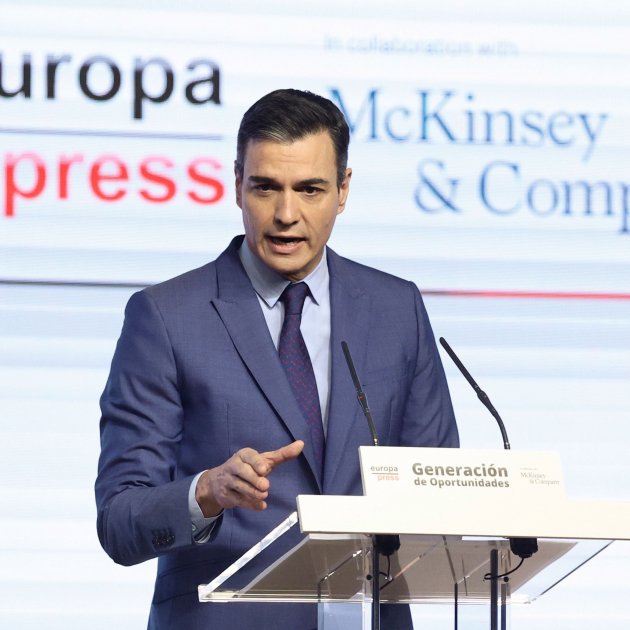An across-the-board cut in prices at Spanish service stations, of twenty cents per litre for all fuels, plus a cap on the price of gas in power generation, which could be 50 euros/MWh. Finally, Pedro Sánchez announced this Monday the measures with which he intends to alleviate the effects of the dramatic price rises. Tomorrow, a cabinet decree will approve the measures to lessen the economic consequences of the war in Ukraine. The Spanish government did not want to reveal the contents of its proposed actions until after last week's European Council meeting, where it had hoped to achieve something for consumers, which was finally an "Iberian exception" for Spain and Portugal to limit the price of gas. The minister Félix Bolaños has already contacted the parliamentary parties to share the details of the initiative, which they hope will be passed with a broad consensus. All of these measures will last until June 30th. Except for the gas cap, which needs the approval of Brussels, the rest will take effect on April 1st.
At a conference entitled "Generating opportunities", organized by Europa Press and McKinsey & Company, the Spanish PM announced the main measures of the action plan that will be passed this Tuesday. The plan covers five areas: energy; assistance to families, workers and refugees; support to businesses; transport measures; and cybersecurity. From today until June 30th, there will be an expected public investment of 6 billion euros in direct aid and tax cuts, and 10 billion in credits through Spain's Official Credit Institute (ICO).
As for families and workers, the "minimum reduction" of 20 cents per litre of fuel (not just for carriers) stands out; 15 cents per litre will be assumed by the state and at least 5 by the oil companies (some have announced that they will reduce by more). But other measures are contemplated, such as the recovery of the ERTO furlough schemes to prevent layoffs, a limit on rent increases to a maximum of 2%, an increase of 15% in the amount paid under the Minimum Income scheme, the extension of tax cuts benefitting electricity bills and the extension of the electric social bond to 660,000 more families.
In the electricity area, the main measure, "exceptional" and "temporary", will be to set a "reference price" for the gas used to produce electricity. Pedro Sánchez has not put a figure on this limit - which some media put at 50 euros / MWh - but he has asserted that it will allow a "significant reduction in electricity bills". This week, Spain and Portugal will present a proposal to the European Commission, which they hope will be approved "in a very short time". Once this happens, it will be published in the Spanish state gazette the next day, to take "immediate effect".
To support businesses, the Spanish government will open a new line of credit support for 10 billion euros and also packages for specific sectors, such as 362 million euros for the agriculture and livestock sector and 68 million for fishing. These are in addition to the 1 billion euros already announced last week for the transport sector. The action plan also includes 150 "essential actions" in the field of cybersecurity.
"Ambitious plan"
In his speech, the Spanish prime minister defended that the plan presented is a "serious, ambitious and also complex plan", given that there are many sectors in play. Sanchez made it clear that "the government is well aware of the difficulties, concerns and uncertainties" facing citizens and businesses. "What we can promise is that we will act to deviate the effects as much as possible, and that we will distribute the sacrifices in a balanced way," the Socialist leader said. Sources in the government highlight the "good reception" they have received from the parliamentary parties and hope that they "show unity and responsibility in the response to the war provoked by Putin and add their support to the great national agreement."
All this comes after the European Council meeting held last Thursday and Friday in Brussels, where Spain and Portugal achieved EU recognition in principal of an "Iberian exception", treating the peninsula as an "energy island" because of its specific circumstances and thus with some ability to control its own energy regime. The proposal they make, however, will have to go through the European Commission, which will have to give its approval. According to the estimates of the Spanish executive, this could take three or four weeks.
